BMP3004 BSc Business Management: Factors Influencing Motivation
VerifiedAdded on 2023/06/14
|7
|1965
|425
Essay
AI Summary
This essay delves into the multifaceted concept of motivation within the workplace, examining both intrinsic and extrinsic factors that influence employee behavior. It references Maslow's hierarchy of needs to analyze the different levels of human needs in a work context, from basic physiological requirements to self-actualization. The essay identifies various motivators such as salary, promotion opportunities, and work environment, while also addressing negative factors like abusive supervision and job stress. Strategies for coping with these negative influences, including growth opportunities and immediate praise, are discussed. The conclusion emphasizes the importance of understanding and applying relevant motivational strategies to retain key employees and foster a positive work environment. Desklib provides a platform for students to access this and other solved assignments.
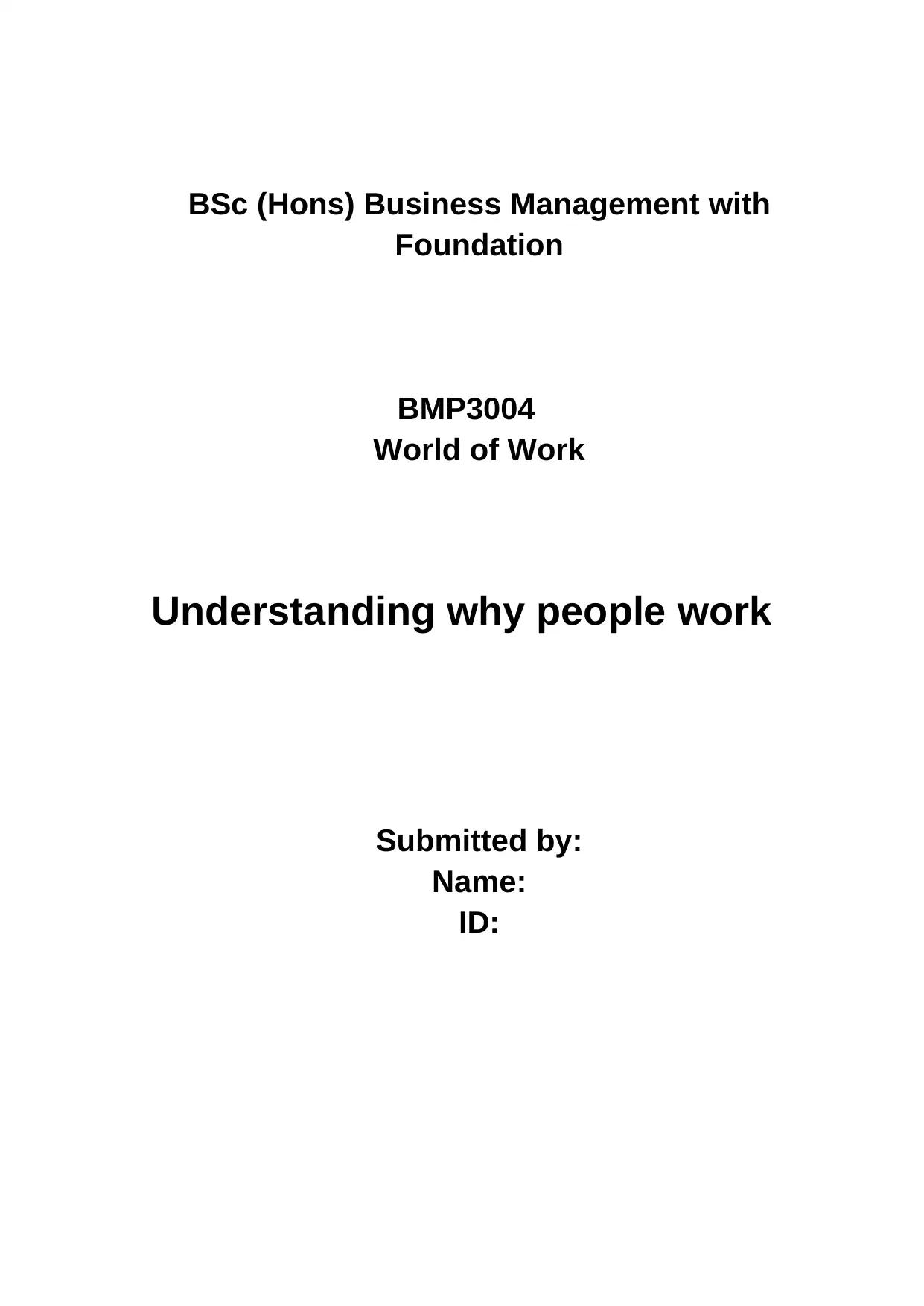
BSc (Hons) Business Management with
Foundation
BMP3004
World of Work
Understanding why people work
Submitted by:
Name:
ID:
Foundation
BMP3004
World of Work
Understanding why people work
Submitted by:
Name:
ID:
Paraphrase This Document
Need a fresh take? Get an instant paraphrase of this document with our AI Paraphraser
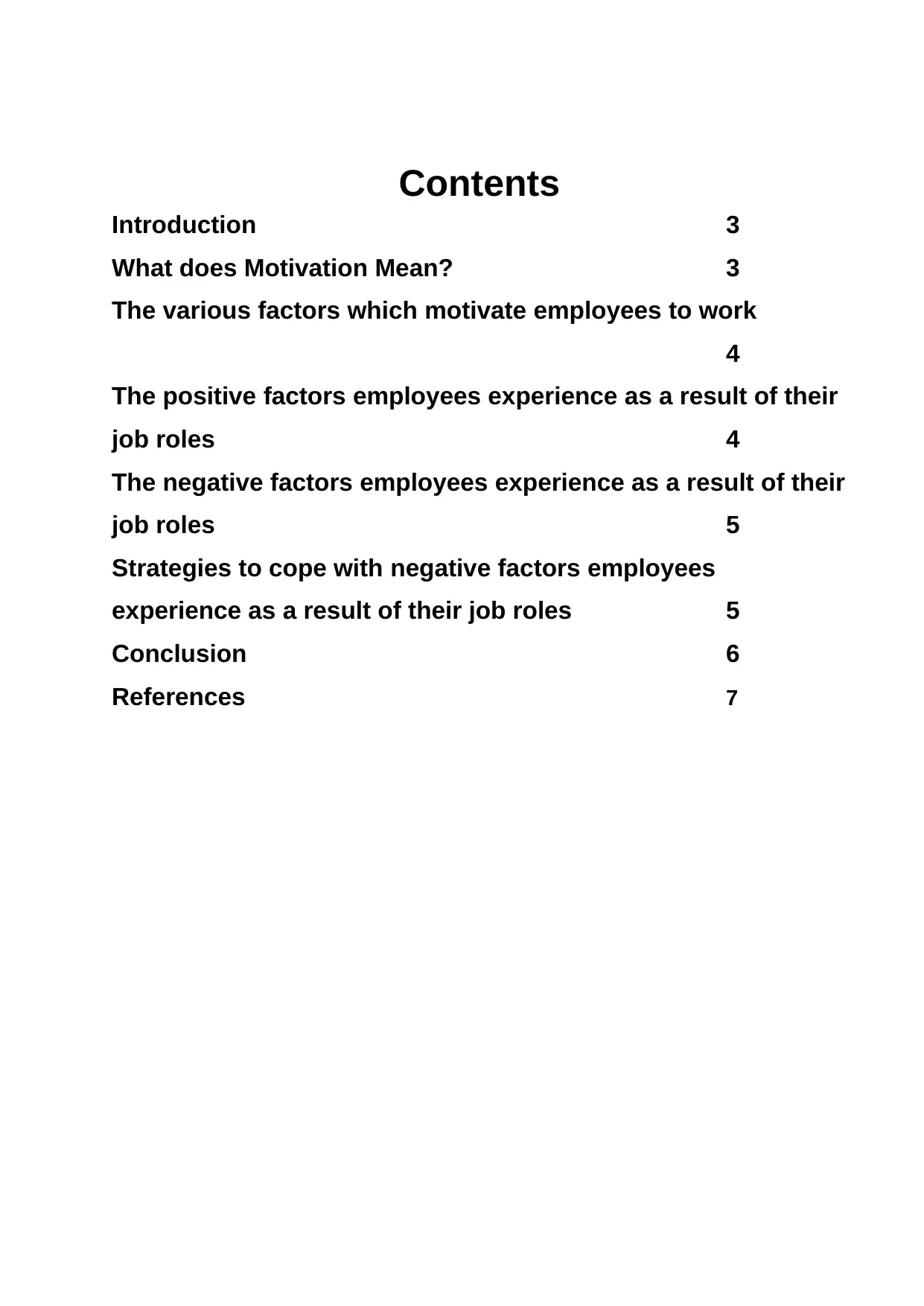
Contents
Introduction 3
What does Motivation Mean? 3
The various factors which motivate employees to work
4
The positive factors employees experience as a result of their
job roles 4
The negative factors employees experience as a result of their
job roles 5
Strategies to cope with negative factors employees
experience as a result of their job roles 5
Conclusion 6
References 7
Introduction 3
What does Motivation Mean? 3
The various factors which motivate employees to work
4
The positive factors employees experience as a result of their
job roles 4
The negative factors employees experience as a result of their
job roles 5
Strategies to cope with negative factors employees
experience as a result of their job roles 5
Conclusion 6
References 7

⊘ This is a preview!⊘
Do you want full access?
Subscribe today to unlock all pages.

Trusted by 1+ million students worldwide

Introduction
The following assessment is based upon the facts that why and how human behave
and act towards work in the company. Motivation can have both positive and negative
influences on the employees (Maslow, 2019). It is important to use different but useful
strategies to motivate individuals in the company. Along with this, motivation theory is
mentioned to analyse the different levels of needs that a human experiences throughout
the work life.
What does Motivation Mean?
Motivation is very essential in any business as it makes individuals to do their work
productively and efficiently in the company. It is meant by the emotional and physiological
force that guides a person or group of individual regarding with their behaviour in the
company. Basically, motivation is of two types intrinsic and extrinsic motivation. Intrinsic
motivation defines a psychological concept where employees engage themselves in an
activity or a task which makes them enjoyable and provides satisfaction to them. This is not
involve a guaranteed reward but enables a person to know his potential. For examples,
feelings of respect from mentors or seniors, pride in the work, personal growth and many
more (Breva and Galindo, 2020). Extrinsic motivation is the motivation in which a person
engages in the activity in order to get rewards or prizes or to avoid the consequences such
as termination in the organisation. For example, promotion, increase in pay and many more.
Maslow's hierarchy theory of motivation:
The scholar Abraham Maslow was the founder of this theory who believed that there
are five essential needs of human that are generated in his life and human works to fulfill all
such needs in his entire life. He said that if one basic need is fulfill that it no longer
motivates the person and shifts to next level of needs. He demonstrated all such needs in a
pyramid. The following is the explanation of all such needs:
Physiological needs: This implies that basis needs of human such as air, food, water,
sleep, clothing and many more, by which a human cannot survive in his life. For a
working person, it can be fresh water, adequate rest hours, food and so on.
Safety needs: This need implies that need of security and safety at the workplace.
For a working person, it can be medical claims, financial security and many more.
Social needs: The need of love and belongingness is essential for a person which
means that a person wants to be accepted and involved in the society where he lives
or where he works. For a working person, it can be involvement in group, effective
communication with fellow members, sharing feelings and sentiments with
colleague and many more.
Self-esteem needs: This represents the need of respected and admired by other
members in the company. In an organisational setting, it can be recognition,
appreciation, respect by the superiors, extra responsibilities and many more.
Self-actualization needs: It is highest level need in the pyramid which represents the
need to reach potential and be worthy at the company (Genevrier, Zambrzhitskaia,
and Yagodin, 2019). It is need to become potential and competent at workplace
which is incredibly individual. For working person, the desire to become the manager
in the company.
4
The following assessment is based upon the facts that why and how human behave
and act towards work in the company. Motivation can have both positive and negative
influences on the employees (Maslow, 2019). It is important to use different but useful
strategies to motivate individuals in the company. Along with this, motivation theory is
mentioned to analyse the different levels of needs that a human experiences throughout
the work life.
What does Motivation Mean?
Motivation is very essential in any business as it makes individuals to do their work
productively and efficiently in the company. It is meant by the emotional and physiological
force that guides a person or group of individual regarding with their behaviour in the
company. Basically, motivation is of two types intrinsic and extrinsic motivation. Intrinsic
motivation defines a psychological concept where employees engage themselves in an
activity or a task which makes them enjoyable and provides satisfaction to them. This is not
involve a guaranteed reward but enables a person to know his potential. For examples,
feelings of respect from mentors or seniors, pride in the work, personal growth and many
more (Breva and Galindo, 2020). Extrinsic motivation is the motivation in which a person
engages in the activity in order to get rewards or prizes or to avoid the consequences such
as termination in the organisation. For example, promotion, increase in pay and many more.
Maslow's hierarchy theory of motivation:
The scholar Abraham Maslow was the founder of this theory who believed that there
are five essential needs of human that are generated in his life and human works to fulfill all
such needs in his entire life. He said that if one basic need is fulfill that it no longer
motivates the person and shifts to next level of needs. He demonstrated all such needs in a
pyramid. The following is the explanation of all such needs:
Physiological needs: This implies that basis needs of human such as air, food, water,
sleep, clothing and many more, by which a human cannot survive in his life. For a
working person, it can be fresh water, adequate rest hours, food and so on.
Safety needs: This need implies that need of security and safety at the workplace.
For a working person, it can be medical claims, financial security and many more.
Social needs: The need of love and belongingness is essential for a person which
means that a person wants to be accepted and involved in the society where he lives
or where he works. For a working person, it can be involvement in group, effective
communication with fellow members, sharing feelings and sentiments with
colleague and many more.
Self-esteem needs: This represents the need of respected and admired by other
members in the company. In an organisational setting, it can be recognition,
appreciation, respect by the superiors, extra responsibilities and many more.
Self-actualization needs: It is highest level need in the pyramid which represents the
need to reach potential and be worthy at the company (Genevrier, Zambrzhitskaia,
and Yagodin, 2019). It is need to become potential and competent at workplace
which is incredibly individual. For working person, the desire to become the manager
in the company.
4
Paraphrase This Document
Need a fresh take? Get an instant paraphrase of this document with our AI Paraphraser
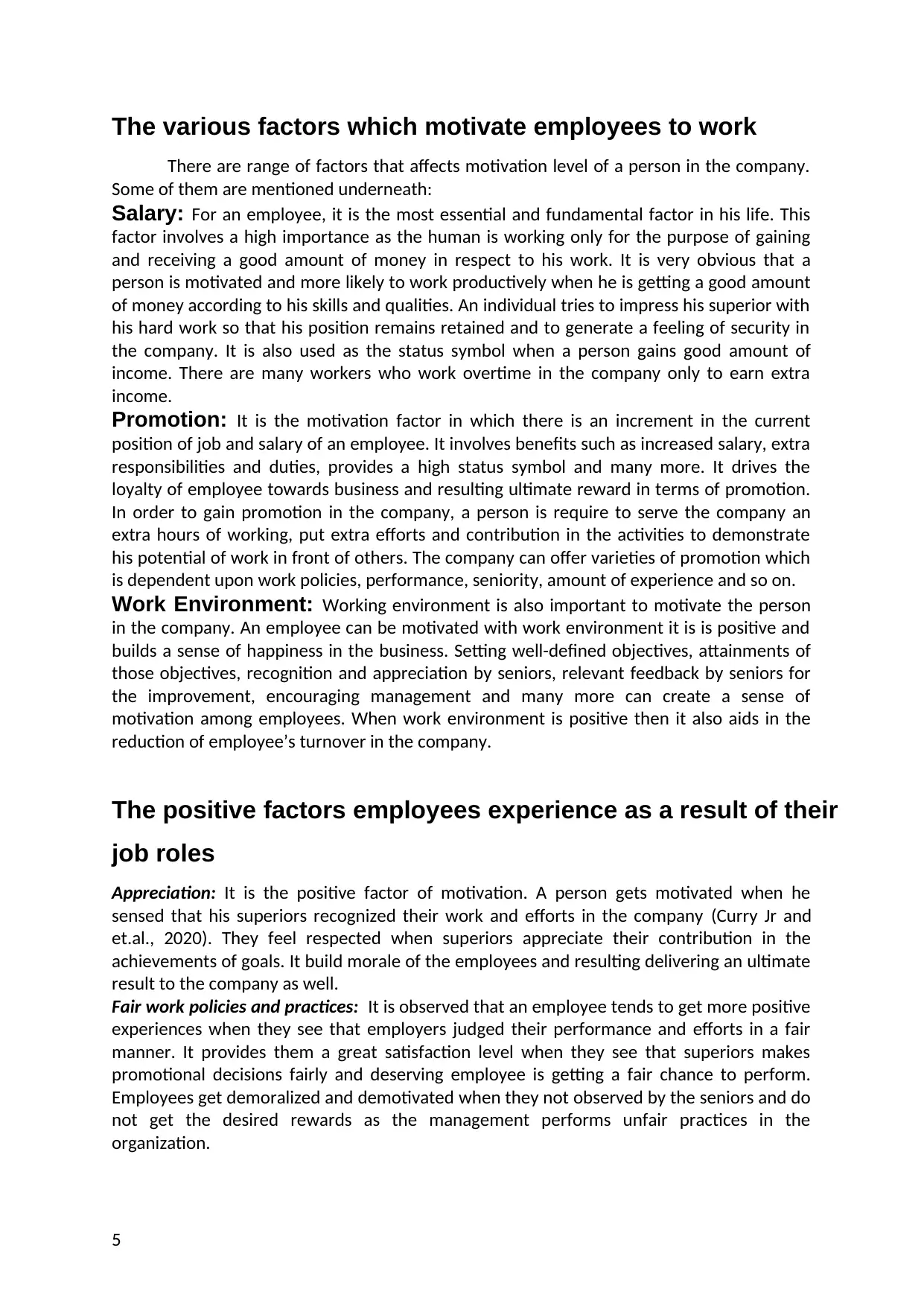
The various factors which motivate employees to work
There are range of factors that affects motivation level of a person in the company.
Some of them are mentioned underneath:
Salary: For an employee, it is the most essential and fundamental factor in his life. This
factor involves a high importance as the human is working only for the purpose of gaining
and receiving a good amount of money in respect to his work. It is very obvious that a
person is motivated and more likely to work productively when he is getting a good amount
of money according to his skills and qualities. An individual tries to impress his superior with
his hard work so that his position remains retained and to generate a feeling of security in
the company. It is also used as the status symbol when a person gains good amount of
income. There are many workers who work overtime in the company only to earn extra
income.
Promotion: It is the motivation factor in which there is an increment in the current
position of job and salary of an employee. It involves benefits such as increased salary, extra
responsibilities and duties, provides a high status symbol and many more. It drives the
loyalty of employee towards business and resulting ultimate reward in terms of promotion.
In order to gain promotion in the company, a person is require to serve the company an
extra hours of working, put extra efforts and contribution in the activities to demonstrate
his potential of work in front of others. The company can offer varieties of promotion which
is dependent upon work policies, performance, seniority, amount of experience and so on.
Work Environment: Working environment is also important to motivate the person
in the company. An employee can be motivated with work environment it is is positive and
builds a sense of happiness in the business. Setting well-defined objectives, attainments of
those objectives, recognition and appreciation by seniors, relevant feedback by seniors for
the improvement, encouraging management and many more can create a sense of
motivation among employees. When work environment is positive then it also aids in the
reduction of employee’s turnover in the company.
The positive factors employees experience as a result of their
job roles
Appreciation: It is the positive factor of motivation. A person gets motivated when he
sensed that his superiors recognized their work and efforts in the company (Curry Jr and
et.al., 2020). They feel respected when superiors appreciate their contribution in the
achievements of goals. It build morale of the employees and resulting delivering an ultimate
result to the company as well.
Fair work policies and practices: It is observed that an employee tends to get more positive
experiences when they see that employers judged their performance and efforts in a fair
manner. It provides them a great satisfaction level when they see that superiors makes
promotional decisions fairly and deserving employee is getting a fair chance to perform.
Employees get demoralized and demotivated when they not observed by the seniors and do
not get the desired rewards as the management performs unfair practices in the
organization.
5
There are range of factors that affects motivation level of a person in the company.
Some of them are mentioned underneath:
Salary: For an employee, it is the most essential and fundamental factor in his life. This
factor involves a high importance as the human is working only for the purpose of gaining
and receiving a good amount of money in respect to his work. It is very obvious that a
person is motivated and more likely to work productively when he is getting a good amount
of money according to his skills and qualities. An individual tries to impress his superior with
his hard work so that his position remains retained and to generate a feeling of security in
the company. It is also used as the status symbol when a person gains good amount of
income. There are many workers who work overtime in the company only to earn extra
income.
Promotion: It is the motivation factor in which there is an increment in the current
position of job and salary of an employee. It involves benefits such as increased salary, extra
responsibilities and duties, provides a high status symbol and many more. It drives the
loyalty of employee towards business and resulting ultimate reward in terms of promotion.
In order to gain promotion in the company, a person is require to serve the company an
extra hours of working, put extra efforts and contribution in the activities to demonstrate
his potential of work in front of others. The company can offer varieties of promotion which
is dependent upon work policies, performance, seniority, amount of experience and so on.
Work Environment: Working environment is also important to motivate the person
in the company. An employee can be motivated with work environment it is is positive and
builds a sense of happiness in the business. Setting well-defined objectives, attainments of
those objectives, recognition and appreciation by seniors, relevant feedback by seniors for
the improvement, encouraging management and many more can create a sense of
motivation among employees. When work environment is positive then it also aids in the
reduction of employee’s turnover in the company.
The positive factors employees experience as a result of their
job roles
Appreciation: It is the positive factor of motivation. A person gets motivated when he
sensed that his superiors recognized their work and efforts in the company (Curry Jr and
et.al., 2020). They feel respected when superiors appreciate their contribution in the
achievements of goals. It build morale of the employees and resulting delivering an ultimate
result to the company as well.
Fair work policies and practices: It is observed that an employee tends to get more positive
experiences when they see that employers judged their performance and efforts in a fair
manner. It provides them a great satisfaction level when they see that superiors makes
promotional decisions fairly and deserving employee is getting a fair chance to perform.
Employees get demoralized and demotivated when they not observed by the seniors and do
not get the desired rewards as the management performs unfair practices in the
organization.
5
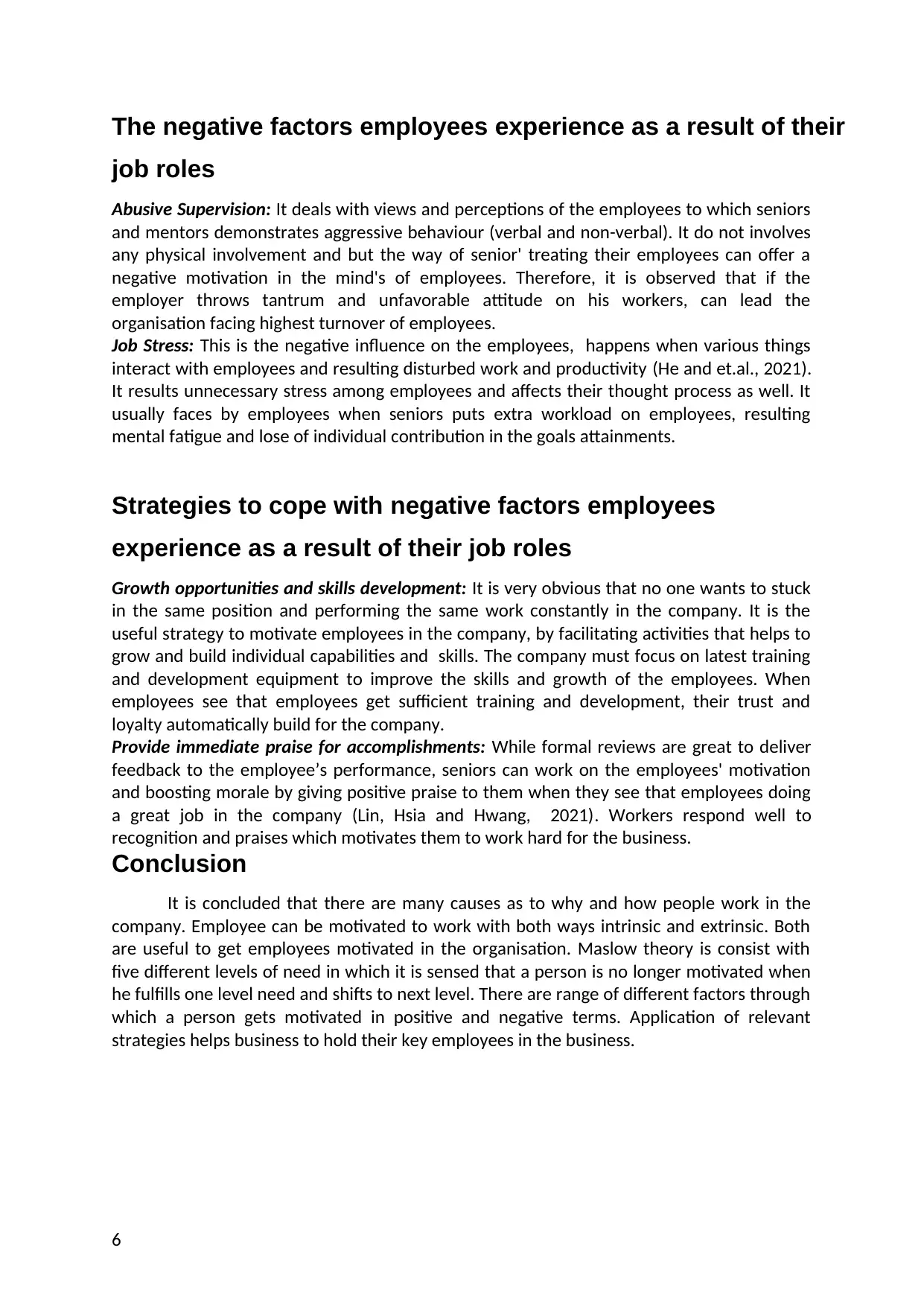
The negative factors employees experience as a result of their
job roles
Abusive Supervision: It deals with views and perceptions of the employees to which seniors
and mentors demonstrates aggressive behaviour (verbal and non-verbal). It do not involves
any physical involvement and but the way of senior' treating their employees can offer a
negative motivation in the mind's of employees. Therefore, it is observed that if the
employer throws tantrum and unfavorable attitude on his workers, can lead the
organisation facing highest turnover of employees.
Job Stress: This is the negative influence on the employees, happens when various things
interact with employees and resulting disturbed work and productivity (He and et.al., 2021).
It results unnecessary stress among employees and affects their thought process as well. It
usually faces by employees when seniors puts extra workload on employees, resulting
mental fatigue and lose of individual contribution in the goals attainments.
Strategies to cope with negative factors employees
experience as a result of their job roles
Growth opportunities and skills development: It is very obvious that no one wants to stuck
in the same position and performing the same work constantly in the company. It is the
useful strategy to motivate employees in the company, by facilitating activities that helps to
grow and build individual capabilities and skills. The company must focus on latest training
and development equipment to improve the skills and growth of the employees. When
employees see that employees get sufficient training and development, their trust and
loyalty automatically build for the company.
Provide immediate praise for accomplishments: While formal reviews are great to deliver
feedback to the employee’s performance, seniors can work on the employees' motivation
and boosting morale by giving positive praise to them when they see that employees doing
a great job in the company (Lin, Hsia and Hwang, 2021). Workers respond well to
recognition and praises which motivates them to work hard for the business.
Conclusion
It is concluded that there are many causes as to why and how people work in the
company. Employee can be motivated to work with both ways intrinsic and extrinsic. Both
are useful to get employees motivated in the organisation. Maslow theory is consist with
five different levels of need in which it is sensed that a person is no longer motivated when
he fulfills one level need and shifts to next level. There are range of different factors through
which a person gets motivated in positive and negative terms. Application of relevant
strategies helps business to hold their key employees in the business.
6
job roles
Abusive Supervision: It deals with views and perceptions of the employees to which seniors
and mentors demonstrates aggressive behaviour (verbal and non-verbal). It do not involves
any physical involvement and but the way of senior' treating their employees can offer a
negative motivation in the mind's of employees. Therefore, it is observed that if the
employer throws tantrum and unfavorable attitude on his workers, can lead the
organisation facing highest turnover of employees.
Job Stress: This is the negative influence on the employees, happens when various things
interact with employees and resulting disturbed work and productivity (He and et.al., 2021).
It results unnecessary stress among employees and affects their thought process as well. It
usually faces by employees when seniors puts extra workload on employees, resulting
mental fatigue and lose of individual contribution in the goals attainments.
Strategies to cope with negative factors employees
experience as a result of their job roles
Growth opportunities and skills development: It is very obvious that no one wants to stuck
in the same position and performing the same work constantly in the company. It is the
useful strategy to motivate employees in the company, by facilitating activities that helps to
grow and build individual capabilities and skills. The company must focus on latest training
and development equipment to improve the skills and growth of the employees. When
employees see that employees get sufficient training and development, their trust and
loyalty automatically build for the company.
Provide immediate praise for accomplishments: While formal reviews are great to deliver
feedback to the employee’s performance, seniors can work on the employees' motivation
and boosting morale by giving positive praise to them when they see that employees doing
a great job in the company (Lin, Hsia and Hwang, 2021). Workers respond well to
recognition and praises which motivates them to work hard for the business.
Conclusion
It is concluded that there are many causes as to why and how people work in the
company. Employee can be motivated to work with both ways intrinsic and extrinsic. Both
are useful to get employees motivated in the organisation. Maslow theory is consist with
five different levels of need in which it is sensed that a person is no longer motivated when
he fulfills one level need and shifts to next level. There are range of different factors through
which a person gets motivated in positive and negative terms. Application of relevant
strategies helps business to hold their key employees in the business.
6
⊘ This is a preview!⊘
Do you want full access?
Subscribe today to unlock all pages.

Trusted by 1+ million students worldwide
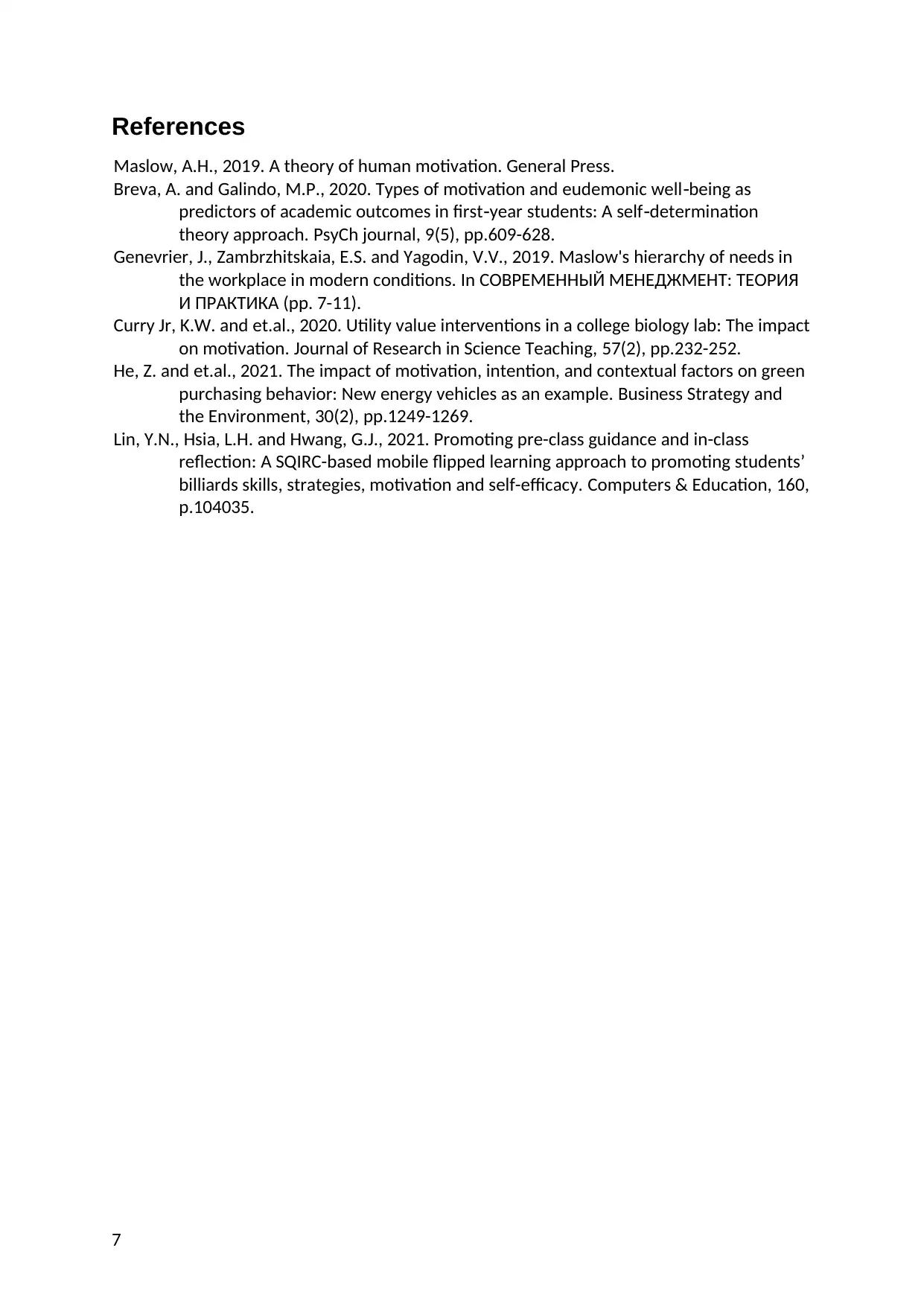
References
Maslow, A.H., 2019. A theory of human motivation. General Press.
Breva, A. and Galindo, M.P., 2020. Types of motivation and eudemonic well being as‐
predictors of academic outcomes in first year students: A self determination‐ ‐
theory approach. PsyCh journal, 9(5), pp.609-628.
Genevrier, J., Zambrzhitskaia, E.S. and Yagodin, V.V., 2019. Maslow's hierarchy of needs in
the workplace in modern conditions. In СОВРЕМЕННЫЙ МЕНЕДЖМЕНТ: ТЕОРИЯ
И ПРАКТИКА (pp. 7-11).
Curry Jr, K.W. and et.al., 2020. Utility value interventions in a college biology lab: The impact
on motivation. Journal of Research in Science Teaching, 57(2), pp.232-252.
He, Z. and et.al., 2021. The impact of motivation, intention, and contextual factors on green
purchasing behavior: New energy vehicles as an example. Business Strategy and
the Environment, 30(2), pp.1249-1269.
Lin, Y.N., Hsia, L.H. and Hwang, G.J., 2021. Promoting pre-class guidance and in-class
reflection: A SQIRC-based mobile flipped learning approach to promoting students’
billiards skills, strategies, motivation and self-efficacy. Computers & Education, 160,
p.104035.
7
Maslow, A.H., 2019. A theory of human motivation. General Press.
Breva, A. and Galindo, M.P., 2020. Types of motivation and eudemonic well being as‐
predictors of academic outcomes in first year students: A self determination‐ ‐
theory approach. PsyCh journal, 9(5), pp.609-628.
Genevrier, J., Zambrzhitskaia, E.S. and Yagodin, V.V., 2019. Maslow's hierarchy of needs in
the workplace in modern conditions. In СОВРЕМЕННЫЙ МЕНЕДЖМЕНТ: ТЕОРИЯ
И ПРАКТИКА (pp. 7-11).
Curry Jr, K.W. and et.al., 2020. Utility value interventions in a college biology lab: The impact
on motivation. Journal of Research in Science Teaching, 57(2), pp.232-252.
He, Z. and et.al., 2021. The impact of motivation, intention, and contextual factors on green
purchasing behavior: New energy vehicles as an example. Business Strategy and
the Environment, 30(2), pp.1249-1269.
Lin, Y.N., Hsia, L.H. and Hwang, G.J., 2021. Promoting pre-class guidance and in-class
reflection: A SQIRC-based mobile flipped learning approach to promoting students’
billiards skills, strategies, motivation and self-efficacy. Computers & Education, 160,
p.104035.
7
1 out of 7
Related Documents
Your All-in-One AI-Powered Toolkit for Academic Success.
+13062052269
info@desklib.com
Available 24*7 on WhatsApp / Email
![[object Object]](/_next/static/media/star-bottom.7253800d.svg)
Unlock your academic potential
Copyright © 2020–2026 A2Z Services. All Rights Reserved. Developed and managed by ZUCOL.

